- Learning time
- 30 minutes
- First play time
- 90 minutes
Taverns of Tiefenthal
Designed by: Wolfgang Warsch
In The Taverns of Tiefenthal, players take the roles of competitive innkeepers trying to attract the wealthiest customers to their taverns.
Everyone takes a board – representing their tavern – and places it in front of them. Certain elements of the board can be upgraded by flipping them over, but everyone starts with the ‘basic’ sides face-up. Players also begin with a hand of cards, and over 8 rounds will deal themselves a certain amount of cards that function as either workers or customers in their tavern. When your cards run out they are shuffled and become your draw pile again.
Once everyone has dealt out cards, dice are rolled and assigned in order to ‘activate’ the workers and customers – but before we get to that let’s take a closer look at the cards.
Workers are great, because they get you all manner of extra stuff: more dice, more cash, more beer, or the capacity to change the result on the dice to you take. But customers get you money, which is one of the game’s currencies (the other being beer). You begin with just three tables in your tavern, and keep dealing cards until they are populated by customers (only one per table!) at which point you can deal no more cards.
Then everyone rolls four dice and take turns ‘drafting’ them: taking a die for yourself, and passing the rest on, repeated until all dice have been claimed. Once that’s done, you assign the dice to your tavern: placed with customers, they’ll earn you money, placed elsewhere they earn either beer or the bonuses mentioned above. Finally everyone cashes in; claiming the money and beer rewards and spending them: spend beer to attract customers, or money to hire more workers and improve your tavern – maybe even getting extra tables, which can make a huge difference to the profitability of your tavern!
Newly-attracted customers are worth points, with nobles in particular earning you a whopping ten points each at the end of the game. You can attract nobles like any other customer – with beer – but whenever you pay to upgrade your tavern, flipping one of various sections over to its more productive, desirable side, you get a free noble as well. Thus, there are different strategies to pursue here: attracting folks by word of mouth by brewing the best beer (or loads of beer, at least) or racking up cash from punters and turning your tavern into a gastro-pub, gathering nobles that way.
When the final round is over, points are counted up from all your cards and the player with the most points is anointed Best Landlord.
Joe says
I was excited to discover Taverns in my local game shop, having heard nothing bout it and being a fan of the designer - I decided to break my run of not buying any big box games. For some reason I am really enamoured of German games involving beer - monks brewing ale, cosy taverns in the woods. This one certainly loos the part - I love that your tavern fits together jigsaw-wise and fills out during the game - it's a very seductive little sandbox to play in. The gameplay, however, falls somewhat short for me. The duck-building aspect has some interesting tweaks, but the core experience didn't feel sufficiently engaging or taut. That the game comes with a number of expansions that you can add in seemed promising, but although we didn't try all of them, they appeared to just add more ways of doing the same sort of things, rather than pushing the gameplay in any new direction. For me, the playing of the game didn't match the promise of its glorious look and feel.
The guru's verdict
-
Take That!
Take That!
Not a huge helping. Players can, however, see what dice their opponents really want and make spoiling moves...
-
Fidget Factor!
Fidget Factor!
Variable depending on both player count and the players themselves. But it's not heavy enough to really ever grind to a halt.
-
Brain Burn!
Brain Burn!
Tiefenthal is what gamers refer to as an 'engine builder' where the challenge is really about getting the disparate parts to combine into a productive whole. But, as with this designer's Quacks of Quedlingburg, there are moments when you have to surrender to fate.
-
Again Again!
Again Again!
There's some strategic and tactical depth here, but Tiefenthal is really about those moments when everything comes together and you pull off an uber-move of epic proportions.

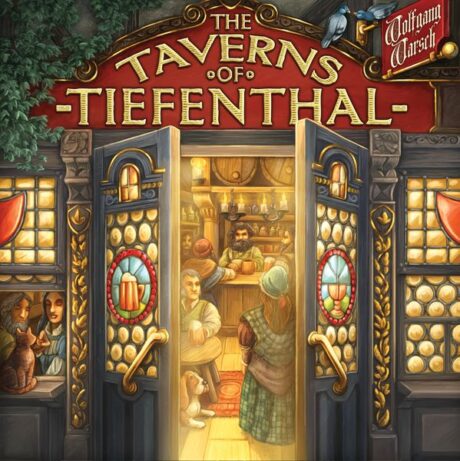
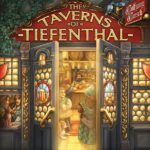
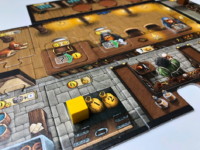
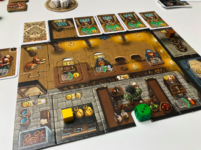
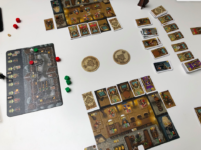


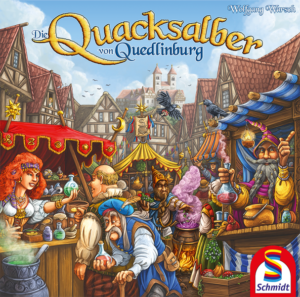
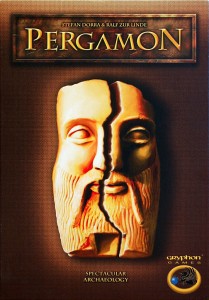

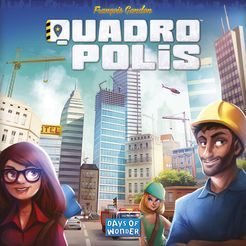
Sam says
...Plus a few wrinkles we've not covered here, such as the noble track that triggers extra rewards as you move up it, and special customers that give you powers, but cost schnapps to do so... A very serviceable game that relies - to hit its high spots - on the little dopamine rushes of cards flipping at the right time and much-needed combinations coming off. When that happens, it's fun, and feels genuinely rewarding. I enjoyed it just fine, but without getting particularly excited to return to it over and over.